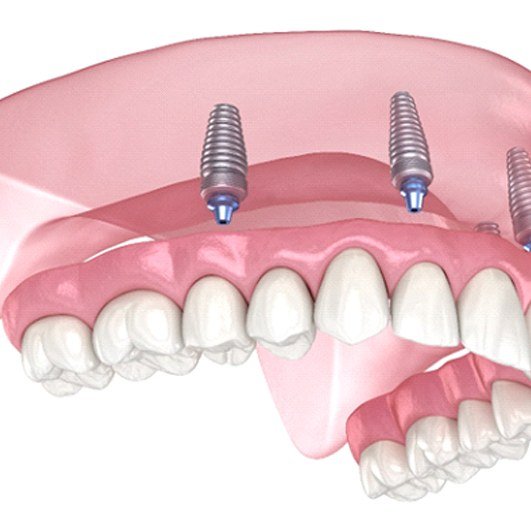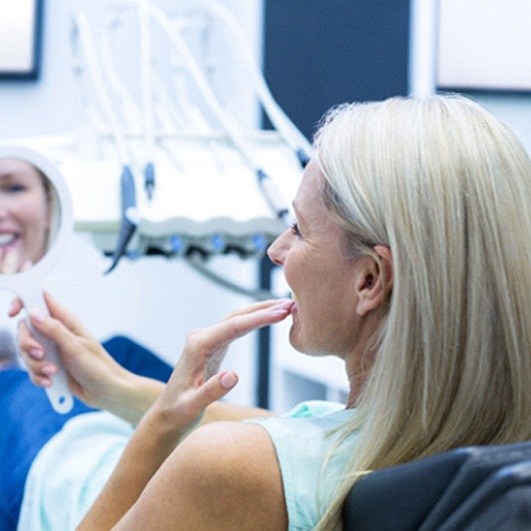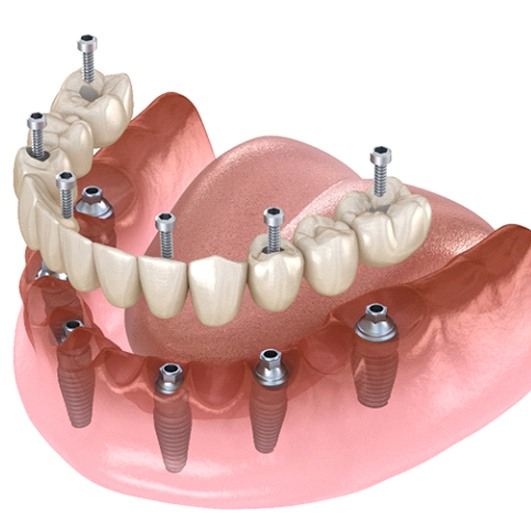Teeth in a Day – Houston, TX
A Streamlined Way to Rebuild Your Smile
For years, patients with extensive tooth loss have relied on dental implant-supported prosthetics to rebuild their smiles from the roots up. However, for many denture wearers, a lengthy treatment time and the prospect of multiple surgeries makes them hesitate to commit to dental implants. Furthermore, bone loss in the jaw may make it difficult for them to qualify for implants. Fortunately, such patients may be eligible for Teeth in a Day in Houston, which is also widely known as All-on-4 in Houston. Contact Piney Point Dental Implant Center today to learn more about this innovative procedure.
How Do Teeth in a Day Implants Work?

Dental implants are prosthetic tooth roots. After they are inserted into the jawbone, they fuse with the surrounding tissue and are thus able to provide a strong base of support for the artificial teeth that get attached to them.
Teeth in a Day is a special type of dental implant treatment that involves placing 4 – 6 implants into the jaw at strategic locations, where the bone tends to be naturally strong and thick. Immediately after the implants are in place, a provisional (temporary) denture is attached to them. Later, the provisional prosthetic is replaced by a permanent one.
Am I a Candidate for Teeth in a Day Implants?

Generally speaking, candidates for Teeth in a Day:
- Have lost all or most of their teeth.
- Have adequate bone density in their jaw to support dental implants. (Most patients meet this criterion even without a bone graft.)
- Are free of active gum disease and other serious oral health conditions.
- Are in fair overall health.
- Maintain excellent oral care habits.
If you aren’t sure if you qualify for Teeth in a Day, visit your implant dentist in Houston for a consultation. Most patients who want dental implants do qualify for them, either immediately or after some preparatory treatments.
What Are the Benefits of Teeth in a Day Implants?

Some of the top benefits of Teeth in a Day implants include:
- You can expect your prosthetic teeth to be strong enough to stand up to virtually any food.
- Your teeth will be permanently secured in your mouth, so you can treat them in almost the same way that you would treat natural teeth.
- Jawbone preservation. Dental implants prevent the bone deterioration that normally occurs after tooth loss.
- Teeth in a Day restorations are carefully designed with the goal of making them look as natural as possible.
Teeth in a Day vs. Traditional Dental Implants

Some of the biggest differences between Teeth in a Day and traditional dental implants include:
- Teeth in a Day usually requires just one surgery, as opposed to the two or more that are often necessary in traditional procedures.
- Teeth in a day is a faster process that allows you to get your teeth on the same day as your implant surgery.
- Teeth in a Day is exclusively for full-arch replacement, whereas traditional implants are more versatile.
- Teeth in a Day usually uses fewer implants than traditional full-arch procedures, a fact that can facilitate lower costs and a quicker recovery. The use of more implants in traditional procedures may contribute to the sturdiest prosthetic possible.
Teeth in a Day FAQs

If you are interested in Teeth in a Day “near me,” the Piney Point team is ready to serve you. Before scheduling your consultation, however, you may be curious to learn more about this procedure and what to expect from it. Read on to discover the answers to some frequently asked questions about Teeth in a Day. If you do not find the specific information you were hoping for, give us a call so we can personally assist you.
Does the Procedure Really Take Just One Day?
From beginning to end, the Teeth in a Day process requires multiple appointments spaced out across several months. The name of the procedure comes from the fact that during just one day, we can extract your remaining natural teeth, insert your dental implants into your jawbone, and provide you with a beautiful new implant denture. This is in contrast to traditional dental implant procedures, which may require extractions, implant placement, and denture placement to occur at different appointments over the course of many months.
How Much Do Teeth in a Day Cost?
The cost of Teeth in a Day can vary from patient to patient. During your consultation, we will provide you with a price estimate and help you consider your payment options. Generally speaking, Teeth in a Day is more affordable than implant procedures requiring multiple surgeries and using a higher number of prosthetic tooth roots. You can view your treatment as a worthwhile investment in your oral health and overall wellness.
Is There Any Difference Between Teeth in a Day and All-on-4 Dental Implants?
The name “All-on-4” highlights the fact that this procedure can replace an entire arch of missing teeth with as few as four dental implants. The name “Teeth in a Day” showcases the procedure’s expedited nature. Essentially, though, the two terms refer to the same treatment.
What Can I Eat After the Teeth in a Day Surgery?
Even though you will have a beautiful new set of teeth immediately after your surgery, you will not be able to dig into all of your favorite foods right away. You can expect your mouth to be sore. Plus, since the dental implants will be new to your body, they will not yet have formed a strong bond with your jawbone. Therefore, you will need to stick to a no-chew diet for a while after your surgery. This can include things like yogurt, pudding, and brothy soups. Further along in your healing process, you will be able to gradually incorporate tougher items into your diet. Once you are completely recovered, you will have the freedom to enjoy virtually any food, including those off-limits with conventional dentures.

